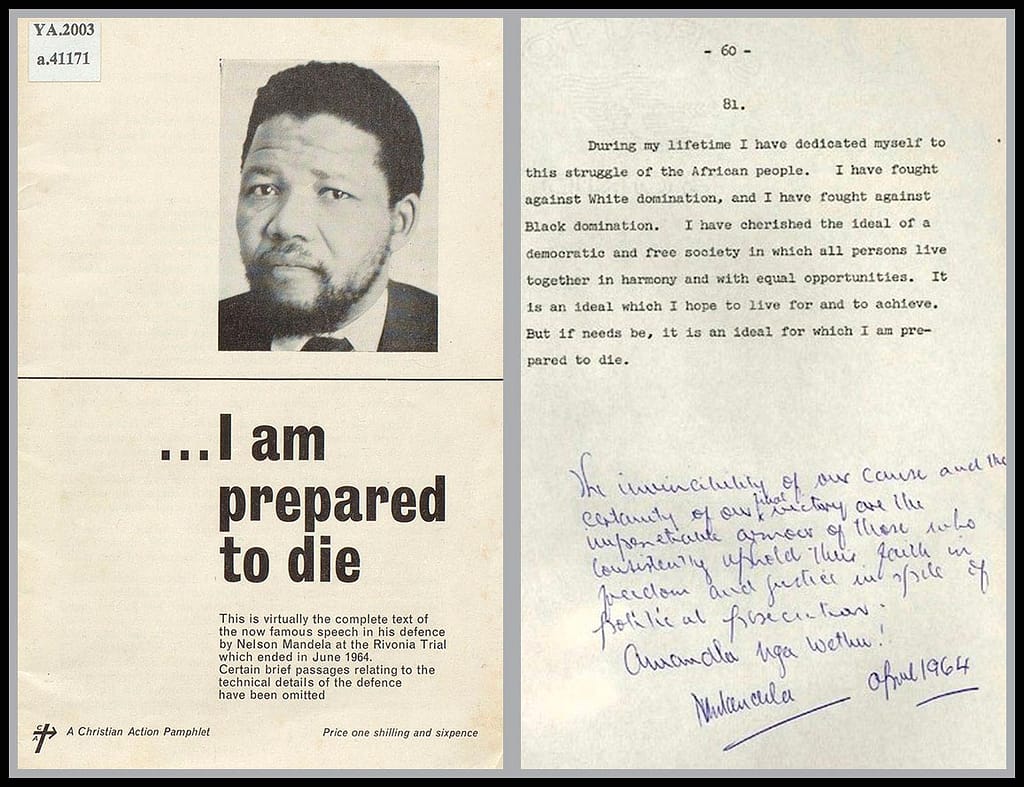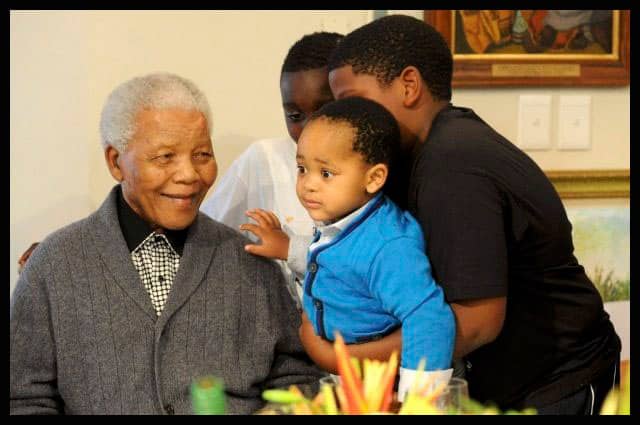‘Long Walk To Freedom‘ is Nelson Mandela’s autobiography. It was written by himself in the crucible of his suffering, and not in the relative ease of his later years. It tells us what he really believes and feels, without fear, favor or prejudice; as such it provides us with Mandela’s blueprint for greatness.
Here, in my opinion, are the top ten characteristics of greatness as recorded and lived by the great man himself. If you want to skip straight to the Top-Ten List, click here:
1. True To Thyself
Mandela knew what the values and ideals were that defined who he was, and never betrayed them:
- “I realized that they could take everything from me except my mind and my heart… I decided not to give them away.”
- “In prison you must find consolation in being true to your ideals, even if no one else knows it.”
- “Any man or institution that tries to rob me of my dignity will lose because I will not part with it at any price or under any pressure.”
- Braam Fischer begged Mandela not to read the last sentence of his declaration from the dock, but Mandela was adamant – his ideals were more important to him than his own life:
“But if needs be, it is an ideal for which I am prepared to die.”

2. Kindness
Mandela, despite his fierce determination to overthrow the unkindness of apartheid, never allowed it to harden his own heart:
- “I learned as a boy to defeat my opponents without dishonouring them.”
- “I did not contemplate escape when people were kind to me – I did not want to take advantage of their trust.”
- After punishing a fellow prisoner for jeopardising their privileges by his selfish behaviour, Mandela felt sorry for him soon after and relented:
“He had suffered far more than I had. I had not eaten half my sandwich and I immediately gave it to him.”

3. Unafraid of change
Mandela was a man of definite opinions, but was never afraid to change when the circumstances or facts demanded:
- Despite his deep ties to culture and king, Mandela refused to submit to the kings attempt to marry him to someone he did not love. His decision to leave home to escape what he perceived as the unreasonable demands of culture, was a brave one:
“I felt that all the currents of my life were taking me away from the Transkei and towards what seemed like the centre, a place where regional and ethnic loyalties gave way to a common purpose.”
- His determination to pursue the armed struggle, despite the deeply rooted ANC tradition of non-violence, was one he never gave up on despite repeated rejection by the ANC leadership.
- At the end, just before his release, his decision to forge ahead with talks with the government without the approval of the ANC leadership was inspired by his belief that:
“There are times when a leader must move out ahead of the flock, go off in a new direction, confident that he is leading his people the right way.”

4. self criticism
Mandela was a man without the debilitating effects of ego on personal growth. When he, or the ANC, made an error, he was always quick to own it and apologise:
- At a meeting Mandela criticised ANC president Chief Luthuli for being ‘overawed by the white man’. Luthuli responded by pointing out that Mandela was yet young and ignorant of the white man, being ‘barely out of your student uniform.’ Mandela says:
“I immediately withdrew my charge and apologized. I was a young man who attempted to make up for his ignorance with militancy.”

5. discipline
Mandela understood that discipline is the triumph of the mind over the body; as such he subjected himself to a strict routine of arising early and daily exercise:
- As a boxer he attended the gym for one and a half hours each evening from Monday to Thursday. When his work in the struggle demanded that he sacrifice this pleasure, he determined to arise at 5.00 am every day and run on the spot for an hour.
- On Robben Island he continued do his exercises every day in his cramped cell at 5.00 am. When he was transferred to Pollsmoor, now in his sixties, he rejoiced at being in a large, communal cell:
“I now had room to stretch out. I followed my usual regimen of stationary running, skipping, sit-ups and fingertip press-ups. My comrades were not early risers and my programme made me a very unpopular fellow in our cell.”

6. passion
Nelson Mandela was a passionate man. Education, reason and organisation were all necessary tools in his box, but it was his passion that drove him to where other, equally educated, reasonable and organised men could not go:
- He was passionate in his personal relations. Listen to how he felt about Winnie on their first meeting:
“Something in me was deeply stirred by her presence…I do know that the moment I first glimpsed Winnie Nomzamo, I knew that I wanted to have her as my wife.”
- An important part of Mandela’s reading on Robben island was the classic Greek plays, of which he says:
“I found them enormously elevating… that a hero was a man who would not break down even under the most trying circumstances.”

7. gratitude
Graciousness and greatness are almost always synonymous. Mandela never took anything for granted, and was always grateful for even the smallest act of kindness towards him:
- When taken by his Victor Verster warder, W/O Brand, to meet the warders family, Mandela responded to the kindness by sending the children Christmas cards every year after that.
- When about to be released from Victor Verster, one of Mandela’s first concerns was that he should get the opportunity to thank the guards and warders, and their families, before he left. When, in the rush of those last, historic moments, he was not able to do this, he was deeply upset:
“I was greatly vexed by the fact that I did not have a chance to say good-bye to the prison staff.”
- While travelling from Victor Verster to the Cape Town City Hall to deliver his freedom speech, and already nearly two hours late, Mandela insisted they stop at the side of the road to thank a white family who showed their support.

8. introspection
Although a man of action and a hard worker, Mandela found strength and inspiration by going inside himself. Mostly it was nature and reading that were the mediums he used to do this. He said:
- “Although I am a gregarious person, I love solitude even more.”
- On Robben Island Mandela looked forward to the march to the lime quarry each day:
“I much preferred being outside in nature…to observe birds flitting overhead, to feel the wind blowing in from the sea….”
“Some mornings every living thing, the seagulls and wagtails, the small trees, and even the stray blades of grass seemed to smile and shine in the sun.”
- “One book that I returned to many times was Tolstoy’s great work, War and Peace. It reminded me once again that to truly lead one’s people one must also truly know them.”

9. reconciliation
There is a time for war and a time for peace, and knowing the difference is the hallmark of greatness. Mandela refused to renounce violence until his people were liberated, but he was always pursuing peace:
- When the PAC repeatedly tried to frustrate the ANC’s efforts, dividing the people at a critical moment, Mandela sought commonality rather than conflict:
“I paid particular attention to their policy statement, with the idea of finding affinities rather than differences.”
- In talks with the government while in prison he said to them:
“South Africa belongs to all who live in it, black and white. Whites are Africans as well; we do not want to drive you into the sea.”

10. humility
Unlike many of his contemporaries, Mandela never sought fame, fortune or power as a reward for liberating his people. He said:
- “I have always believed that to be a freedom fighter…one is fighting for the liberation of millions of people, not the glory of one individual.”
- Mandela lived as he preached. In Victor Verster prison, where he had his own chef and staff to look after him, he washed the dishes and made his own bed each day.
- After his release and return to Johannesburg, he insisted on returning to sleep in his own, humble house that he lived in before his imprisonment:
“I yearned to resume a normal and ordinary life….”
The ANC advised him to move into the grand house that Winnie had built a few blocks away, but he resisted:
“It was a house that because of it’s size and expense seemed somehow inappropriate for a leader of the people. I rejected that advice as long as I could. I wanted to live not only among my people, but like them.”

in conclusion
Greatness is always buried deep in the soul of those who possess it; like gold and diamonds, it requires a huge effort to bring it to the surface. It was the evil of apartheid that mined the greatness out of Nelson Mandela, an irony that he recognized:
“Another, unintended, effect was that it produced the Oliver Tambos, the Walter Sisulus, the Chief Luthulis, the Yusuf Dadoos, the Bram Fischers, the Robert Sobukwes of our time – men of such extraordinary courage, wisdom and generosity that their like may never be known again. Perhaps it requires such depths of oppression to create such heights of character.”
In his praise of others, Nelson Mandela provided us with the perfect epitaph for himself.
MANDELA’S TOP-TEN-TIPS FOR GREATNESS
- TRUE TO THYSELF
- KINDNESS
- UNAFRAID OF CHANGE
- SELF CRITICISM
- DISCIPLINE
- PASSION
- GRATITUDE
- INTROSPECTION
- RECONCILIATION
- HUMILITY
